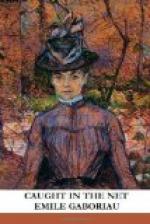“What, that very wealthy gentleman?”
“Just so.”
“Well, if I oppose my father’s wishes, an explanation must ensue, and this just now I do not desire. I therefore intend to speak openly to M. de Breulh-Faverlay, who is an honorable, straightforward man; and when I tell him the real state of the case, he will withdraw his pretensions.”
“But,” replied Andre, “should he do so, another will come forward.”
“That is very possible, and in his turn the successor will be dismissed.”
“Ah!” murmured the unhappy man, “how terrible will be your life,—a scene of daily strife with your father and mother.”
After a tender farewell, Sabine and Modeste left. Andre had wished to be permitted to go out and procure a vehicle, but this the young girl negatived, and took her leave, saying.—
“I shall see M. de Breulh-Faverlay to-morrow.”
For a moment after he was left alone Andre felt very sad, but a happy thought flashed across his brain.
“Sabine,” said he, “went away on foot, and I may follow her without injury to her reputation.”
In another moment he was in the street, and caught a glimpse of Sabine and her maid under a lamp at the next corner. He crossed to the other side of the way and followed them cautiously.
“Perhaps,” murmured he, “the time is not far distant when I shall have the right to be with her in her walks, and feel her arm pressed against mine.”
By this time Sabine and her companion had reached the Rue Blanche, and hailing a cab, were rapidly driven away. Andre gazed after it, and as soon as it was out of sight, decided to return to his work. As he passed a brilliantly lighted shop, a fresh young voice saluted him.
“M. Andre, M. Andre.”
He looked up in extreme surprise, and saw a young woman, dressed in the most extravagant style, standing by the door of a brougham, which glittered with fresh paint and varnish. In vain he tried to think who she could be, but at length his memory served him.
“Mademoiselle Rose,” said he, “or I am much mistaken.”
A shrill, squeaky voice replied, “Madame Zora Chantemille, if you please.”
Andre turned sharply round and found himself face to face with a young man who had completed an order he was giving to the coachman.
“Ah, is that you?” said he.
“Yes, Chantemille is the name of the estate that I intend to settle on madame.”
The painter examined the personage who had just addressed him with much curiosity. He was dressed in the height or rather the burlesque of fashion, wore an eyeglass, and an enormous locket on his chain. The face which surmounted all this grandeur was almost that of a monkey, and Toto Chupin had not exaggerated its ugliness when he likened it to that animal.
“Pooh,” cried Rose, “what matters a name? All you have to do is to ask this gentleman, who is an old friend of mine, to dinner.” And without waiting for a reply, she took Andre by the hand and led him into a brilliantly lighted hall. “You must dine with us,” she exclaimed; “I will take no denial. Come, let me introduce you, M. Andre, M. Gaston de Gandelu. There, that is all settled.”




